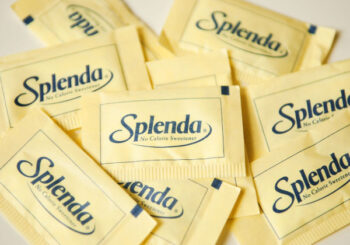By Nikki Harper
Staff Writer for Wake Up World
A recent research study conducted by a team of scientists has uncovered distressing evidence regarding the widely used artificial sweetener sucralose, commercially known as Splenda®. The study reveals that a chemical compound called sucralose-6-acetate, which is formed during the digestion of sucralose, exhibits genotoxic properties by breaking up DNA. Moreover, the study found that trace amounts of sucralose-6-acetate are present in off-the-shelf sucralose products, even before consumption and metabolism, raising serious concerns about the potential health risks associated with this common sweetener.
Led by Susan Schiffman, an esteemed professor in the field of biomedical engineering, the research team at North Carolina State University and the University of North Carolina at Chapel Hill conducted a series of in vitro experiments using human blood cells and gut tissues to assess the effects of sucralose-6-acetate on genetic material and gut health.
The findings of the study were alarming. Schiffman states, “Our new work establishes that sucralose-6-acetate is genotoxic, and that it effectively broke up DNA in cells that were exposed to the chemical.” The implications of this discovery are significant, as genotoxic substances are known to have the potential to cause mutations and increase the risk of various health problems, including cancer.
In addition to the genotoxic effects, the research team discovered that both sucralose and sucralose-6-acetate compromise the integrity of the gut wall, leading to a condition commonly known as “leaky gut.” The chemicals damage the tight junctions between cells in the gut, making the gut wall more permeable. As a result, harmful substances that would normally be expelled from the body through feces can now leak into the bloodstream, posing a threat to overall health.
Further investigation revealed that gut cells exposed to sucralose-6-acetate exhibited increased activity in genes associated with oxidative stress, inflammation, and carcinogenicity. This indicates that the compound has the potential to trigger harmful biological responses that could contribute to chronic diseases and other health complications.
The European Food Safety Authority sets a threshold of toxicological concern for all genotoxic substances at 0.15 micrograms per person per day. Shockingly, the researchers found that the trace amounts of sucralose-6-acetate in a single daily sucralose-sweetened drink surpass this threshold. Moreover, this calculation does not even account for the additional sucralose-6-acetate produced as a metabolite after consuming sucralose.
Susan Schiffman is unequivocal in her assessment of the situation, stating, “This work raises a host of concerns about the potential health effects associated with sucralose and its metabolites. It’s time to revisit the safety and regulatory status of sucralose because the evidence is mounting that it carries significant risks. If nothing else, I encourage people to avoid products containing sucralose. It’s something you should not be eating.”
The implications of this groundbreaking research are far-reaching, as sucralose is extensively used in numerous food and beverage products marketed as low-calorie or sugar-free alternatives. The study sheds light on the urgent need to reevaluate the safety of sucralose and establish robust regulations to protect public health.
The research, titled “Toxicological and pharmacokinetic properties of sucralose-6-acetate and its parent sucralose: in vitro screening assays,” was published in the Journal of Toxicology and Environmental Health, Part B. The study was conducted by Susan S. Schiffman and H. Troy Nagle from North Carolina State University and the University of North Carolina at Chapel Hill, Elizabeth H. Scholl from Sciome LLC, and Terrence S. Furey from the University of North Carolina at Chapel Hill.
The authors of the study have declared no conflicts of interest, and the research was supported by the Engineering Foundation at NC State.
As the scientific community grapples with the implications of these findings, it is crucial for consumers to exercise caution and consider alternative sweeteners that have been thoroughly evaluated for safety. The potential risks associated with sucralose and its metabolites demand immediate attention from regulatory agencies and food manufacturers to protect the well-being of consumers worldwide.
References:
- Chemical Found in Common Sweetener Damages DNA https://news.ncsu.edu/2023/05/genotoxic-chemical-in-sweetener/
- Toxicological and pharmacokinetic properties of sucralose-6-acetate and its parent sucralose: in vitro screening assays. https://www.tandfonline.com/doi/full/10.1080/10937404.2023.2213903
About the author:
 Nikki Harper is a spiritualist writer, astrologer, and editor for Wake Up World. She writes about divination, astrology, mediumship and spirituality at Questionology: Astrology and Divination For the Modern World where you can a freelance astrologer and her mind-body-spirit writing and editing services. Nikki also find out more about her work as also runs a spiritualist centre in North Lincs, UK, hosting weekly mediumship demonstrations and a wide range of spiritual development courses and workshops.
Nikki Harper is a spiritualist writer, astrologer, and editor for Wake Up World. She writes about divination, astrology, mediumship and spirituality at Questionology: Astrology and Divination For the Modern World where you can a freelance astrologer and her mind-body-spirit writing and editing services. Nikki also find out more about her work as also runs a spiritualist centre in North Lincs, UK, hosting weekly mediumship demonstrations and a wide range of spiritual development courses and workshops.







